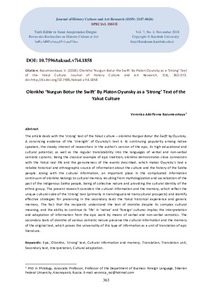Показать сокращенную информацию
Olonkho ‘Nurgun Botur the Swift’ By Platon Oyunsky as a ‘Strong’ Text of the Yakut Culture
| Автор | Разумовская, В. А. | |
| Дата внесения | 2020-01-20T07:55:59Z | |
| Дата, когда ресурс стал доступен | 2020-01-20T07:55:59Z | |
| Дата публикации | 2018 | |
| Библиографическое описание | Разумовская, В. А. Olonkho ‘Nurgun Botur the Swift’ By Platon Oyunsky as a ‘Strong’ Text of the Yakut Culture [Текст] / В. А. Разумовская // Journal of History Culture and Art Research. — 2018. — Т. 7 (№ 4). — С. 363-373 | |
| URI (для ссылок/цитирований) | http://kutaksam.karabuk.edu.tr/index.php/ilk/issue/view/36 | |
| URI (для ссылок/цитирований) | https://elib.sfu-kras.ru/handle/2311/129194 | |
| Описание | Текст статьи не публикуется в открытом доступе в соответствии с политикой журнала. | |
| Аннотация | The article deals with the ‘strong’ text of the Yakut culture – olonkho Nurgun Botur the Swift by Oyunsky. A convincing evidence of the ‘strength’ of Oyunsky’s text is its continuing popularity among native speakers, the steady interest of researchers in the author’s version of the epic, its high educational and cultural potential, as well as the regular translatability into the languages of verbal and non-verbal semiotic systems. Being the classical example of epic tradition, olonkho demonstrates close connection with the Yakut real life and the genuineness of the events described, which makes Oyunsky’s text a reliable historical and ethnographic source of information about the culture and the history of the Sakha people. Along with the cultural information, an important place in the complicated information continuum of olonkho belongs to cultural memory resulting from mythologization and sacralization of the past of the indigenous Sakha people, being of collective nature and providing the cultural identity of the ethnic group. The present research considers the cultural information and the memory, which reflect the unique cultural code of the ‘strong’ text (primarily in translingual and transcultural prospects) and identify effective strategies for preserving in the secondary texts the Yakut historical experience and generic memory. The fact that the recipients understand the text of olonkho despite its complex cultural meaning, and the ability to continue its ‘life’ in ‘native’ and ‘foreign’ cultures implies the interpretation and adaptation of information from the epic work by means of verbal and non-verbal semiotics. The secondary texts of olonkho of various semiotic nature preserve the cultural information and the memory of the original text, which proves the universality of this type of information as a unit of translation of epic literature. | |
| Тема | Epic | |
| Тема | Olonkho | |
| Тема | ‘strong’ text | |
| Тема | Cultural information and memory | |
| Тема | Translation | |
| Тема | Translation unit | |
| Тема | Secondary text | |
| Тема | Interpretation | |
| Тема | Cultural adaptation | |
| Название | Olonkho ‘Nurgun Botur the Swift’ By Platon Oyunsky as a ‘Strong’ Text of the Yakut Culture | |
| Тип | Journal Article | |
| Тип | Journal Article Postprint | |
| Страницы | 363-373 | |
| ГРНТИ | 16.31.41 | |
| Дата обновления | 2020-01-20T07:55:59Z | |
| DOI | 10.7596/taksad.v7i4.1858 | |
| Институт | Институт экономики, управления и природопользования | |
| Подразделение | Кафедра делового иностранного языка | |
| Журнал | Journal of History Culture and Art Research | |
| Квартиль журнала в Web of Science | без квартиля |

